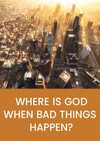Are you sure?
This bookmark will be removed from all folders and any saved notes will be permanently removed.
Where is God when bad things happen? Part 4: Getting out of the mess we're in
with Deborah Huebsch
When it feels like the world is a mess, is it naive to think that God is still here ... or can somehow help? Our guest shares her own journey in getting to know—and experience—the divine power that, she says, is reliable help we can turn to and lean on no matter how big the problem
Deborah Huebsch: While I was in college, I had a really bad experience with the church that I was attending, and it was such a horrible moment for me because I thought if this is Christianity, I don’t want any part of it. If this is God, I don’t want any part of God either. And so I just opted out and became basically an agnostic and just sort of left any sense of deity or higher power. I just left it behind me.
Enjoy 1 free Sentinel article or audio program each month, including content from 1898 to today.
JSH Collections
This audio program is included in:
2021 - PODCAST SERIES
Where is God when bad things happen?
JSH-Online has hundreds of pamphlets, anthologies, and special editions for you to discover.



